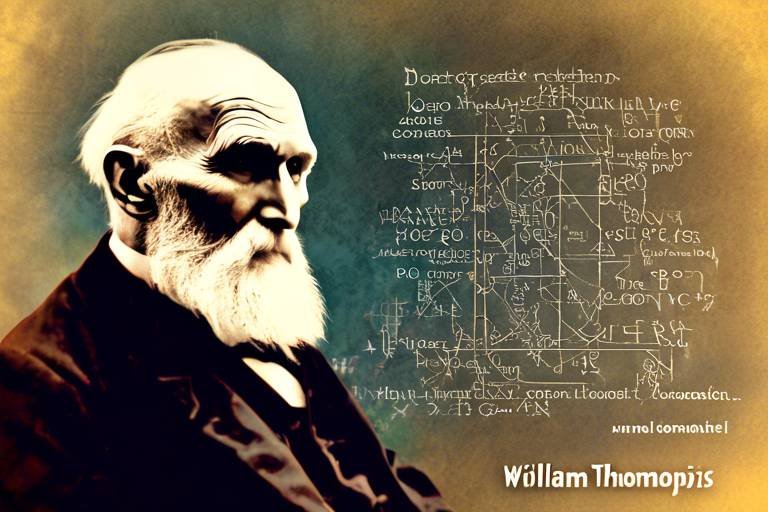Hypatia - The First Female Mathematician
Hypatia of Alexandria, a name that resonates through the ages, stands as a beacon of intellectual brilliance in a time when women were often relegated to the shadows of history. Born around 360 AD in the bustling city of Alexandria, Egypt, Hypatia emerged as a formidable force in mathematics, philosophy, and astronomy. Her contributions were not just groundbreaking; they were a clarion call for the recognition of women's intellectual capabilities in a male-dominated society. Imagine a world where the pursuit of knowledge was fraught with peril, yet Hypatia fearlessly navigated these treacherous waters, leaving an indelible mark on the landscape of mathematics.
Hypatia's life was a tapestry woven with threads of education, mentorship, and innovation. She was the daughter of the esteemed mathematician Theon, who instilled in her a passion for learning and a thirst for knowledge. In the heart of Alexandria, a city renowned for its libraries and scholarly pursuits, Hypatia was exposed to a rich blend of philosophical teachings and mathematical concepts. This vibrant educational environment not only shaped her intellectual development but also set the stage for her future contributions. She became a symbol of enlightenment, embodying the spirit of inquiry and exploration that characterized the Hellenistic period.
What makes Hypatia's story even more compelling is the context in which she lived. The 4th and 5th centuries were tumultuous times in Alexandria, marked by political strife and religious conflict. Yet, amidst this chaos, Hypatia thrived. She became the first woman to make significant contributions to mathematics, particularly in the fields of algebra and geometry. Her work was not merely theoretical; she applied mathematical principles to real-world problems, demonstrating the practical utility of her discipline. Hypatia's legacy is a testament to the power of perseverance, intellect, and the relentless pursuit of knowledge.
In addition to her mathematical prowess, Hypatia was a prominent figure in the Neoplatonist school of thought. She seamlessly integrated mathematical principles with metaphysical ideas, creating a unique philosophical framework that bridged the gap between abstract thought and practical application. This ability to connect seemingly disparate fields exemplifies her innovative spirit and her role as a thinker who transcended the boundaries of her time.
As we delve deeper into Hypatia's life, we uncover not just her achievements but also the challenges she faced. Her position as a female scholar in a patriarchal society illustrated the gender biases that existed in academia. Despite her brilliance, Hypatia often found herself navigating a landscape fraught with opposition and societal constraints. Yet, she remained undeterred, inspiring countless individuals to pursue knowledge and challenge the status quo.
In conclusion, Hypatia's story is not just one of mathematical achievement; it is a powerful narrative that underscores the importance of diversity and representation in intellectual fields. Her legacy continues to resonate today, serving as an inspiration for women in mathematics and science. As we reflect on her contributions, we are reminded of the vital role women have played in the history of mathematics and the ongoing need to promote gender equality in STEM fields.
- Who was Hypatia? Hypatia was a mathematician, philosopher, and astronomer in ancient Alexandria, known for her contributions to mathematics and her role as a teacher.
- What were Hypatia's main contributions to mathematics? Hypatia made significant advancements in algebra and geometry, laying foundational concepts for future generations of mathematicians.
- What challenges did Hypatia face? Hypatia faced societal opposition, political turmoil, and gender bias in a patriarchal society, which limited opportunities for women in academia.
- What is Hypatia's legacy? Hypatia's legacy serves as an inspiration for women in STEM fields, highlighting the importance of diversity and representation in intellectual pursuits.

Early Life and Education
Hypatia was born around 360 AD in the vibrant city of Alexandria, a melting pot of cultures, ideas, and intellectual pursuits. This city was not just a hub for commerce but also a center for learning and philosophy. Growing up in such an environment, Hypatia was fortunate to be surrounded by some of the greatest minds of her time. Her father, Theon of Alexandria, was a well-respected mathematician and astronomer, and he played a crucial role in her education. He recognized her exceptional talent and ensured she received a comprehensive education that included mathematics, astronomy, and philosophy.
From a young age, Hypatia displayed a remarkable aptitude for abstract thinking and problem-solving. Her education was not limited to the traditional teachings of her time; she was also influenced by the works of earlier mathematicians and philosophers. The rich tapestry of knowledge available in Alexandria, including texts from the likes of Euclid and Archimedes, provided her with a solid foundation in geometry and algebra. Imagine being a young girl in a world where few women were given the opportunity to study; Hypatia was a rare gem, shining brightly against the backdrop of societal norms that often stifled female ambition.
As she grew older, Hypatia's thirst for knowledge only intensified. She ventured beyond the confines of her father's teachings and sought out other renowned scholars in Alexandria. This pursuit of knowledge was not just about personal achievement; it was also about challenging the status quo. Hypatia’s education was characterized by a blend of theoretical learning and practical application, which she later integrated into her own teaching methodologies. Her ability to communicate complex ideas with clarity and enthusiasm made her a beloved figure among her students.
In Alexandria, education was not merely confined to the walls of a classroom. Hypatia often participated in vibrant discussions and debates in public forums, where ideas flowed freely. This environment nurtured her critical thinking skills and encouraged her to question established norms. The philosophical schools of Alexandria, particularly the Neoplatonist school, became her intellectual playground. Here, she learned to intertwine mathematical concepts with philosophical inquiries, creating a unique perspective that would later influence her teachings.
Hypatia's early life and education were pivotal in shaping her into the formidable mathematician and philosopher she would become. The challenges she faced as a woman in a male-dominated society only fueled her determination to excel. Her story is not just one of academic achievement; it is a testament to the power of education and the importance of fostering a diverse intellectual community. As we reflect on her early years, we can see the seeds of greatness being sown in a society that often overlooked the potential of women.

Mathematical Contributions
Hypatia of Alexandria is often celebrated as one of the most significant figures in the history of mathematics. Her contributions laid the groundwork for many principles that are still relevant today. She was not just a mathematician; she was a pioneer who bridged the gap between ancient mathematical theories and the burgeoning fields of science and philosophy. Hypatia's work primarily focused on algebra and geometry, where she made advancements that would influence future generations of mathematicians and scientists.
One of her notable contributions was her work on the mathematical treatise known as the "Almagest," originally written by Claudius Ptolemy. Hypatia is believed to have edited and commented on this pivotal work, which laid out the geocentric model of the universe. Her insights helped clarify complex concepts, making them more accessible to her students and the broader scholarly community. In addition to her work on the "Almagest," she also contributed to the development of the astrolabe, an ancient instrument used for solving problems related to time and the position of the stars. This device was crucial for navigation and astronomy, showcasing her ability to apply mathematical principles in practical ways.
Hypatia's teachings emphasized the importance of logical reasoning and mathematical rigor. She believed that mathematics was not merely a set of rules and formulas, but a profound language that could describe the universe. This perspective was revolutionary for her time, as it encouraged her students to think critically and explore mathematical concepts beyond rote memorization. In her classroom, Hypatia fostered an environment where students could engage in lively discussions and challenge established ideas, which was quite rare in a male-dominated academic landscape.
To further illustrate her impact, consider the following table that summarizes her key mathematical contributions:
| Contribution | Description |
|---|---|
| Almagest Commentary | Edited and provided insights on Ptolemy's work, clarifying complex astronomical concepts. |
| Astrolabe Development | Improved the design and functionality of the astrolabe, enhancing its use in navigation and astronomy. |
| Innovative Teaching | Emphasized critical thinking and practical applications of mathematics in her teaching methodologies. |
Hypatia's influence extended beyond her immediate contributions; she was a beacon of knowledge in a time when women were often sidelined in academic pursuits. Her ability to integrate philosophical ideas with mathematical principles not only enriched her own work but also inspired a generation of scholars to view mathematics as a vital tool for understanding the world around them. By blending these disciplines, she helped pave the way for future thinkers who would explore the connections between mathematics, philosophy, and science.
In conclusion, Hypatia's mathematical contributions were not just about numbers and equations; they represented a profound understanding of the world that continues to inspire mathematicians and scientists today. Her legacy is a reminder of the crucial role that women have played in the development of mathematics and the importance of fostering an inclusive environment where all voices can contribute to the advancement of knowledge.
- What were Hypatia's main contributions to mathematics? Hypatia contributed to algebra and geometry, edited Ptolemy's "Almagest," and improved the astrolabe.
- How did Hypatia influence her students? She emphasized critical thinking and practical applications, fostering a collaborative learning environment.
- What challenges did Hypatia face as a female mathematician? Hypatia faced significant gender bias and societal opposition in a male-dominated academic landscape.
- Why is Hypatia's legacy important today? Her contributions highlight the vital role of women in STEM fields and the ongoing need for diversity in academia.

Influence on Neoplatonism
Hypatia's influence on Neoplatonism is a fascinating aspect of her legacy that showcases her ability to blend mathematics with profound philosophical insights. As a leading figure in the Neoplatonist school, she didn’t just teach mathematics; she integrated it into a broader metaphysical framework that sought to understand the nature of reality. This approach was revolutionary at the time, as it challenged the prevailing thought that often separated the realms of science and philosophy.
Neoplatonism, a philosophical system that emerged in the 3rd century AD, was characterized by its emphasis on the existence of a single source of all reality, often referred to as the One. Hypatia's teachings emphasized the connection between this ultimate reality and the mathematical principles governing the universe. She believed that understanding mathematics was not merely about numbers and equations but was a path to grasping the divine order of the cosmos.
In her lectures, Hypatia often encouraged her students to see mathematics as a way to achieve a deeper understanding of existence. She famously stated that “mathematics is the language with which God has written the universe.” This perspective not only elevated the status of mathematics but also positioned Hypatia as a thinker who transcended traditional academic boundaries. Her ability to intertwine mathematics and philosophy inspired her students to think critically about the world around them, fostering a culture of inquiry that was essential to the Neoplatonist movement.
Moreover, Hypatia’s role as a female scholar in a male-dominated field added a unique dimension to her influence. Her existence challenged the gender norms of her time and opened doors for women in academia, albeit temporarily. She became a symbol of intellectual freedom and resilience, embodying the Neoplatonist ideal of the philosopher who seeks truth through rigorous thought and study. Her teachings encouraged her students to question established doctrines and explore the depths of their own understanding.
The impact of Hypatia’s work extended beyond her lifetime, influencing later philosophers and mathematicians who sought to reconcile the emerging scientific understanding of the world with philosophical inquiry. Her legacy is a reminder of the importance of integrating diverse fields of knowledge, showing that the pursuit of truth is not confined to one discipline.
In summary, Hypatia's influence on Neoplatonism was profound and multifaceted. She not only contributed significantly to the mathematical knowledge of her time but also fostered an environment where philosophy and science could coexist and enrich one another. Her innovative approach to teaching and her commitment to intellectual exploration continue to inspire generations, making her a pivotal figure in the history of both mathematics and philosophy.
- Who was Hypatia?
Hypatia was a renowned mathematician, astronomer, and philosopher in ancient Alexandria, known for her contributions to mathematics and her role in the Neoplatonist school. - What were Hypatia's main contributions to mathematics?
Hypatia made significant advancements in algebra and geometry, and her work laid the groundwork for future mathematicians. - How did Hypatia influence philosophy?
She integrated mathematical principles with metaphysical ideas, bridging the gap between mathematics and philosophy. - What challenges did Hypatia face as a female scholar?
Hypatia faced societal opposition and gender bias in a predominantly male academic environment, which limited opportunities for women. - What is Hypatia's legacy today?
Her legacy serves as an inspiration for women in STEM fields and highlights the importance of diversity in intellectual pursuits.

Teaching Methodologies
Hypatia was not just a mathematician; she was a revolutionary educator whose teaching methodologies set her apart in a time when education was predominantly male-oriented. Her approach to teaching mathematics was as innovative as her mathematical contributions. Hypatia believed in the power of critical thinking and encouraged her students to question established norms and explore ideas deeply. Imagine being in a classroom where the teacher inspires you not just to memorize formulas but to understand the very essence of mathematical concepts. That's precisely what Hypatia achieved.
One of her notable methodologies was the integration of practical applications with theoretical knowledge. Hypatia understood that mathematics wasn't just about numbers and equations; it was a tool to solve real-world problems. She often used real-life examples to illustrate complex concepts, making them more relatable and easier to grasp. This hands-on approach not only made learning enjoyable but also instilled a sense of confidence in her students, empowering them to tackle challenging problems.
Moreover, Hypatia was a firm believer in engagement and interaction. She fostered an environment where students were encouraged to participate actively in discussions. Rather than simply lecturing, she posed thought-provoking questions that stimulated debate and exploration among her students. This interactive style of teaching not only enhanced comprehension but also nurtured a community of learners who supported each other's intellectual growth.
In addition to her dynamic classroom environment, Hypatia often employed demonstrations and visual aids to convey complex mathematical principles. For instance, she might have used geometric models or diagrams to help her students visualize abstract concepts, making them more tangible. This method resonates with the modern understanding of diverse learning styles, where visual, auditory, and kinesthetic learning techniques are employed to cater to different preferences.
Hypatia's teaching extended beyond the confines of her classroom. She frequently held public lectures, allowing her to reach a broader audience and ignite a passion for learning in the community. These lectures were not mere recitations of mathematical theories; they were vibrant discussions that brought together students, scholars, and curious minds from all walks of life. By doing so, Hypatia fostered a culture of intellectual inquiry that transcended societal barriers, encouraging people to engage with mathematics and philosophy.
In summary, Hypatia's teaching methodologies were groundbreaking for her time. By emphasizing critical thinking, practical applications, and interactive learning, she not only educated her students but also inspired a generation to appreciate the beauty of mathematics. Her legacy as an educator continues to influence teaching practices today, reminding us that education is not just about imparting knowledge but about cultivating a love for learning.
- What were Hypatia's main contributions to mathematics? Hypatia made significant advancements in algebra and geometry, contributing to foundational concepts that influenced future mathematicians.
- How did Hypatia's teaching methods differ from those of her contemporaries? Hypatia emphasized critical thinking, practical applications, and interactive learning, making her approach more engaging and accessible.
- What challenges did Hypatia face as a female scholar? Hypatia faced societal opposition and gender bias in a patriarchal society, which limited opportunities for women in academia.
- What is Hypatia's legacy today? Hypatia's legacy serves as an inspiration for women in mathematics and science, highlighting the importance of diversity in intellectual fields.

Public Lectures and Engagements
This article explores the life and contributions of Hypatia, a pioneering female mathematician in ancient Alexandria, highlighting her achievements, influence, and the challenges she faced in a male-dominated field.
Hypatia's formative years were marked by a rich educational environment in Alexandria, where she was exposed to various philosophical and mathematical teachings that shaped her intellectual development.
Hypatia made significant advancements in mathematics, particularly in algebra and geometry, which laid foundational concepts that influenced future generations of mathematicians and scientists.
As a prominent figure in the Neoplatonist school, Hypatia's philosophical teachings integrated mathematical principles with metaphysical ideas, bridging the gap between mathematics and philosophy.
Hypatia was known for her innovative teaching methods, which emphasized critical thinking and practical applications of mathematics, inspiring her students to explore complex concepts.
Hypatia's public lectures were not just academic exercises; they were vibrant gatherings that brought together students, scholars, and the wider community of Alexandria. Imagine a bustling amphitheater filled with eager minds, hanging onto her every word as she discussed profound mathematical theories and philosophical ideas. Her ability to communicate complex concepts in an accessible manner made her a beloved figure among her audience.
She often tailored her lectures to address relevant societal issues, intertwining mathematics with everyday life. This approach not only engaged her students but also encouraged the general public to appreciate the beauty and utility of mathematics. Hypatia's lectures covered a variety of topics, including:
- Geometry and its applications - Demonstrating how geometric principles could solve real-world problems.
- Algebraic methods - Introducing innovative techniques that simplified complex calculations.
- Philosophical implications of mathematics - Discussing how mathematical truths could lead to greater understanding of the universe.
Moreover, Hypatia's interactive style fostered a culture of inquiry and debate. She encouraged her students to ask questions, challenge assumptions, and think critically. This method not only deepened their understanding but also empowered them to become independent thinkers. Her public engagements were a testament to her belief that knowledge should be shared and accessible to all, regardless of gender or social status.
Hypatia's influence extended beyond the classroom. She often collaborated with other intellectuals, hosting discussions that attracted diverse perspectives. These gatherings became a melting pot of ideas, where science, philosophy, and mathematics converged. Her commitment to fostering a community of learning left an indelible mark on the intellectual landscape of her time.
Hypatia was a respected member of the scientific community, collaborating with other scholars and contributing to the preservation and advancement of scientific knowledge in her era.
Despite her achievements, Hypatia faced significant challenges, including societal opposition and political turmoil, which ultimately culminated in her tragic fate.
Hypatia's position as a female scholar in a patriarchal society illustrates the gender biases that existed in academia, limiting opportunities for women in intellectual pursuits.
Hypatia's legacy continues to resonate today, serving as an inspiration for women in mathematics and science, and highlighting the importance of diversity in intellectual fields.
Reflecting on Hypatia's life and contributions underscores the vital role of women in the history of mathematics and the ongoing need to promote gender equality in STEM fields.
- Who was Hypatia? Hypatia was a renowned mathematician, philosopher, and astronomer in ancient Alexandria, known for her contributions to mathematics and her role as a teacher.
- What were Hypatia's main contributions to mathematics? She made significant advancements in algebra and geometry, influencing future generations of mathematicians.
- How did Hypatia impact the scientific community? Hypatia was a respected figure who collaborated with other scholars and fostered a culture of inquiry and learning.
- What challenges did Hypatia face? As a female scholar in a patriarchal society, she faced significant gender bias and societal opposition throughout her career.
- What is Hypatia's legacy today? Hypatia continues to inspire women in STEM fields, highlighting the importance of diversity and inclusion in academia.

Role in the Scientific Community
Hypatia was not just a mathematician; she was a beacon of intellectual prowess in the ancient world, particularly within the vibrant scientific community of Alexandria. Her role transcended mere numbers and equations; she was a collaborator, a mentor, and a bridge between various fields of knowledge. Hypatia's contributions were multifaceted, as she engaged with scholars from diverse disciplines, including astronomy, philosophy, and mathematics, fostering a culture of collaboration that was essential for the advancement of science during her time.
One of the remarkable aspects of Hypatia's scientific endeavors was her ability to integrate knowledge from different domains. For instance, her work in mathematics was closely linked with her interests in astronomy. She is often credited with refining the astrolabe, an ancient instrument used for solving problems related to time and the position of the stars. This not only showcased her mathematical skills but also her understanding of practical applications in astronomy.
Hypatia also played a crucial role in the preservation of earlier scientific works. In a time when many texts were lost to conflict and ignorance, she was instrumental in teaching and disseminating the works of great scholars like Euclid and Archimedes. Her lectures attracted students from various backgrounds, eager to learn from her vast knowledge. This environment of learning and inquiry was vital for nurturing the next generation of thinkers.
Moreover, Hypatia's impact on the scientific community was not limited to her immediate circle. She often held public lectures that were open to anyone interested in learning, regardless of their social status. This accessibility to knowledge was revolutionary, as it broke down barriers that typically excluded many from intellectual pursuits. In this way, Hypatia contributed to a more inclusive scientific community, encouraging participation from a diverse audience.
To illustrate her influence, consider the following table that highlights some of the key contributions Hypatia made to the scientific community:
| Contribution | Description |
|---|---|
| Refinement of the Astrolabe | Improved the design and functionality of this astronomical instrument. |
| Preservation of Texts | Maintained and taught the works of earlier mathematicians and philosophers. |
| Public Lectures | Engaged with the community through accessible lectures on complex topics. |
| Innovative Teaching Methods | Encouraged critical thinking and practical applications in her teaching. |
In essence, Hypatia's role in the scientific community was one of a pioneer. She not only advanced mathematical concepts but also championed the importance of collaboration and accessibility in education. Her legacy serves as a reminder that the pursuit of knowledge thrives on diversity and inclusion, a lesson that remains relevant in today's academic and scientific environments.
- What were Hypatia's main contributions to mathematics? Hypatia made significant advancements in algebra and geometry, refining mathematical concepts that influenced future generations.
- How did Hypatia influence the scientific community? She integrated knowledge across disciplines, preserved ancient texts, and made education accessible through public lectures.
- What challenges did Hypatia face as a female scholar? Hypatia encountered gender bias and societal opposition in a patriarchal society, which limited opportunities for women in academia.
- Why is Hypatia considered a significant figure in history? Her role as a pioneering female mathematician and philosopher continues to inspire women in STEM fields and highlights the importance of diversity in intellectual pursuits.

Challenges and Opposition
Despite her remarkable achievements, Hypatia faced a multitude of challenges that stemmed from the societal norms and political climate of her time. Living in a male-dominated society, she often found herself battling against entrenched gender biases that sought to undermine her status as a respected scholar. Imagine being a brilliant mind, yet constantly having to prove your worth simply because of your gender. This was the reality for Hypatia, who had to navigate a world where women were often relegated to the shadows of intellectual pursuits.
One of the most significant challenges she encountered was the societal opposition to women in academia. Hypatia's position as a female mathematician was not just rare; it was often met with skepticism and hostility. Many of her male contemporaries viewed her presence in the intellectual arena as a threat, rather than an opportunity for collaboration. The prevailing attitudes of the time created a hostile environment, where her contributions were frequently downplayed or dismissed. This bias was not merely personal but systemic, as women were generally discouraged from pursuing higher education or scholarly activities.
Moreover, the political turmoil in Alexandria during Hypatia's lifetime exacerbated these challenges. The city was rife with conflict, particularly between the Christian and pagan communities. Hypatia, a devoted Neoplatonist, found herself caught in the crossfire of these ideological battles. As tensions escalated, her prominence as a public figure made her a target for those who opposed her philosophical beliefs. The very qualities that made her a brilliant mathematician and philosopher also rendered her vulnerable to the whims of political factions. In a society where allegiances shifted like sand, Hypatia's commitment to her ideals ultimately led to her tragic fate.
To further understand the societal and political dynamics that Hypatia faced, consider the following table that highlights key factors contributing to her challenges:
| Factor | Description |
|---|---|
| Gender Bias | Widespread skepticism towards women's capabilities in academia, limiting their opportunities for advancement. |
| Political Turmoil | Conflict between different ideological factions in Alexandria, which placed Hypatia at risk due to her Neoplatonist beliefs. |
| Public Perception | As a female scholar, Hypatia had to constantly combat stereotypes and societal expectations that undermined her achievements. |
In addition to these external pressures, Hypatia also dealt with the internal struggle of maintaining her identity as a scholar in a world that often sought to define her by her gender. Her resilience in the face of such adversity is a testament to her character and intellect. She not only excelled in her field but also paved the way for future generations of women in mathematics and science. Hypatia's story serves as a powerful reminder of the importance of perseverance and the need to challenge societal norms that seek to limit potential.
- What were Hypatia's main contributions to mathematics?
Hypatia made significant advancements in algebra and geometry, influencing future mathematicians and scientists. - How did Hypatia influence philosophy?
As a prominent figure in Neoplatonism, she integrated mathematical principles with metaphysical ideas, bridging the gap between math and philosophy. - What challenges did Hypatia face as a female mathematician?
Hypatia faced gender bias, societal opposition, and political turmoil that limited her opportunities and ultimately led to her tragic fate. - What is Hypatia's legacy today?
Hypatia's legacy continues to inspire women in mathematics and science, highlighting the importance of diversity in intellectual fields.

Gender Bias in Academia
Hypatia's journey through the world of academia serves as a poignant reminder of the gender biases that have historically plagued the field. In a time when women were often relegated to the background, Hypatia emerged as a beacon of intelligence and capability, yet she faced relentless challenges simply because of her gender. Imagine being a brilliant mathematician and philosopher, yet constantly having to prove your worth in a male-dominated society. This was the reality for Hypatia, who, despite her profound knowledge and teaching prowess, found herself battling societal norms that deemed women unfit for intellectual pursuits.
The academic landscape of Hypatia's time was fraught with obstacles. Women were frequently discouraged from pursuing education, and those who dared to defy this expectation often encountered skepticism and hostility. Hypatia's presence in the Neoplatonist school was revolutionary; she not only taught mathematics and philosophy but also challenged the prevailing notion that women should remain silent in scholarly discussions. Her ability to engage with complex ideas and articulate them to her students showcased her exceptional talent, yet it also drew ire from those who believed that a woman's place was at home, not in the lecture hall.
Moreover, the societal structures of ancient Alexandria were inherently patriarchal, which created a significant barrier for women like Hypatia. The male-dominated academic circles often dismissed the contributions of female scholars, undermining their achievements and relegating them to secondary roles. This systemic gender bias not only stifled the voices of women in academia but also limited the scope of intellectual discourse. Hypatia's struggle was not just a personal battle; it was a reflection of a broader societal issue that has persisted throughout history.
Despite these challenges, Hypatia became a respected figure, illustrating that talent and determination can sometimes transcend societal limitations. She taught her students to think critically and to question the status quo, encouraging them to explore ideas beyond what was traditionally accepted. This spirit of inquiry is what makes her story so inspiring; it reminds us that even in the face of adversity, one can forge a path for others to follow.
As we reflect on Hypatia's legacy, it's crucial to acknowledge the ongoing issues of . Today, women still face numerous challenges in STEM fields, where they are often underrepresented and undervalued. The lessons learned from Hypatia's life are more relevant than ever, highlighting the importance of fostering an inclusive environment that champions diversity and equality. By recognizing and addressing these biases, we can create a more equitable academic landscape for future generations.
- What were the main challenges Hypatia faced as a female scholar? Hypatia faced significant societal opposition, gender bias, and political turmoil that hindered her academic pursuits and ultimately led to her tragic fate.
- How did Hypatia's teaching methods differ from her contemporaries? Hypatia emphasized critical thinking and practical applications of mathematics, encouraging her students to engage deeply with the material rather than merely memorizing facts.
- What is Hypatia's legacy in modern academia? Hypatia's legacy continues to inspire women in mathematics and science, serving as a reminder of the importance of diversity and inclusion in intellectual fields.

Legacy and Impact
Hypatia's legacy is nothing short of remarkable, echoing through the corridors of history and inspiring countless individuals, particularly women, in the fields of mathematics and science. She stands as a symbol of intellectual achievement and resilience, proving that gender should never limit one’s potential. Her contributions to mathematics and philosophy were not merely academic; they were revolutionary, challenging the norms of her time and paving the way for future generations.
One of the most significant aspects of Hypatia's legacy is her role in promoting critical thinking and intellectual inquiry. In a time when women were often relegated to the background, Hypatia emerged as a beacon of knowledge, encouraging her students to question, explore, and innovate. Her teaching methodologies emphasized the importance of understanding concepts rather than rote memorization, a practice that continues to resonate in modern education.
Moreover, Hypatia's influence extended beyond mathematics. As a prominent figure in the Neoplatonist school, she intertwined philosophical ideas with mathematical principles, thus enriching both fields. This integration illustrates the interconnectedness of knowledge, reminding us that disciplines like mathematics, philosophy, and science are not isolated but rather part of a broader tapestry of human understanding.
Hypatia's tragic death at the hands of a mob in 415 AD serves as a stark reminder of the societal challenges faced by women in academia. Her demise was not just a loss for her immediate community but for the entire intellectual world. It highlighted the dangers of political and religious fanaticism, which often stifles progress and silences voices of reason. In many ways, her story is a call to action, urging us to advocate for gender equality and to create inclusive environments in all fields of study.
Today, Hypatia's legacy is celebrated in various ways. Numerous institutions and organizations honor her memory by promoting women in STEM (Science, Technology, Engineering, and Mathematics). Initiatives aimed at encouraging young girls to pursue careers in these fields often draw inspiration from her story. Additionally, literature, art, and even popular media have depicted Hypatia as a pioneer, ensuring that her contributions are not forgotten.
In conclusion, Hypatia's impact transcends time and discipline. She serves as a powerful reminder of the importance of diversity in intellectual pursuits and the necessity of creating spaces where all voices can be heard. As we continue to strive for equality in STEM fields, we can look to Hypatia's life as a source of inspiration and motivation. Her legacy encourages us to challenge societal norms, embrace knowledge, and foster a culture of learning that values contributions from all individuals, regardless of gender.
- Who was Hypatia? Hypatia was a renowned mathematician, astronomer, and philosopher in ancient Alexandria, known for her contributions to mathematics and her role as a teacher.
- What were Hypatia's main contributions to mathematics? Hypatia made significant advancements in algebra and geometry, influencing future generations of mathematicians and scientists.
- How did Hypatia influence philosophy? As a prominent figure in the Neoplatonist school, she integrated mathematical principles with philosophical ideas, bridging the gap between the two disciplines.
- What challenges did Hypatia face? Hypatia faced considerable challenges, including gender bias in academia and societal opposition, which ultimately led to her tragic fate.
- What is Hypatia's legacy today? Hypatia's legacy continues to inspire women in mathematics and science, highlighting the importance of diversity and gender equality in intellectual fields.

Conclusion
Reflecting on the life and contributions of Hypatia reveals not just the remarkable achievements of a pioneering female mathematician but also the profound challenges she faced in a male-dominated society. Hypatia’s journey is a powerful testament to the resilience and intellect of women throughout history, particularly in fields like mathematics and science, where their contributions have often been overlooked or marginalized. Her legacy is not merely a footnote in the annals of history; it serves as a beacon of inspiration for women in STEM today, encouraging them to pursue their passions and break through the barriers that still exist.
In a world that often seems to favor conformity over creativity, Hypatia’s story reminds us of the importance of diversity in intellectual pursuits. She integrated mathematics with philosophy, demonstrating that knowledge is not siloed but interconnected. This holistic approach not only enriched her own work but also inspired generations of scholars who followed in her footsteps. As we continue to advocate for gender equality in STEM fields, we must remember that the contributions of women like Hypatia are vital to the progress of science and mathematics.
As we conclude this exploration of Hypatia's life, it’s essential to recognize the ongoing relevance of her legacy. The challenges she faced—gender bias, societal opposition, and political turmoil—are still present today, albeit in different forms. By acknowledging these issues and striving for a more inclusive academic environment, we honor Hypatia’s memory and ensure that her story continues to inspire future generations. Let us commit to fostering a culture that values diversity, encourages critical thinking, and celebrates the achievements of all individuals, regardless of gender.
- Who was Hypatia? Hypatia was a renowned mathematician, philosopher, and astronomer in ancient Alexandria, known for her contributions to mathematics and her role as a teacher.
- What were Hypatia's main contributions to mathematics? She made significant advancements in algebra and geometry, influencing future generations of mathematicians and scientists.
- What challenges did Hypatia face? Hypatia faced gender bias, societal opposition, and political turmoil, which ultimately led to her tragic fate.
- Why is Hypatia's legacy important today? Her legacy serves as an inspiration for women in STEM fields and highlights the importance of diversity in intellectual pursuits.
- How did Hypatia influence philosophy? As a prominent figure in the Neoplatonist school, she integrated mathematical principles with metaphysical ideas, bridging the gap between mathematics and philosophy.
Frequently Asked Questions
- Who was Hypatia?
Hypatia was a renowned mathematician, astronomer, and philosopher in ancient Alexandria. She is often celebrated as the first female mathematician, known for her contributions to mathematics and her role as a teacher in a male-dominated society.
- What were Hypatia's main contributions to mathematics?
Hypatia made significant strides in algebra and geometry, developing concepts that would influence future generations. She is often credited with advancing the understanding of mathematical principles, particularly in the areas of conic sections and the use of the astrolabe.
- How did Hypatia influence philosophy?
As a prominent figure in the Neoplatonist school, Hypatia integrated mathematical principles with philosophical ideas. Her teachings encouraged students to explore the relationship between mathematics and metaphysics, fostering a deeper understanding of both fields.
- What were Hypatia's teaching methods like?
Hypatia was known for her innovative teaching approaches, which emphasized critical thinking and practical applications of mathematical concepts. She inspired her students to engage with complex ideas and encouraged them to think independently.
- Did Hypatia face challenges in her career?
Yes, despite her achievements, Hypatia faced significant challenges, including gender bias and societal opposition. Living in a patriarchal society, she encountered obstacles that limited opportunities for women in academia, which ultimately contributed to her tragic fate.
- What is Hypatia's legacy today?
Hypatia's legacy continues to resonate, serving as an inspiration for women in mathematics and science. Her life highlights the importance of diversity in intellectual fields and the ongoing need to promote gender equality in STEM disciplines.


















